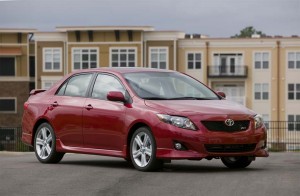
Toyota says the steering behavior of its Corolla is "appropriate," but a grand jury is now investigating its actions.
Toyota could be in trouble yet again, and the subpoena it has received from a U.S. federal grand jury in New York suggests that its latest setback could result in criminal charges relating to steering problems with its Corolla and other models.
The newest subpoena was issued on June 29, Toyota confirmed today, without explaining why it waited so long to confirm the development. It also was advised in March that the company would have to supply documents to a grand jury investigating matters related to its unintended acceleration recalls and braking problems with the Toyota Prius.
Since a spate of safety-related recalls began last October, Toyota has recalled more than 8.5 million vehicles, most for fixes related to unintended acceleration, but also to deal with problems as diverse as hybrid braking issues and extensive corrosion of pickups and minivans. It has also had to address concerns about steering problems with the Corolla and Matrix, 500 owners complaining the vehicles wander at highway speeds.
A week ago, Toyota announced that its own investigation had concluded “the design and performance of the steering system is appropriate” in the two models. But it has also issued a Technical Service Bulletin, or TSB, that would permit dealers to replace their power steering units if customers complain. The move stops short of a recall that would have added yet another 750,000 vehicles to the list of those recently called back by the maker.
“The company and its subsidiaries are sincerely cooperating with authorities on the probe,” the maker said in regards to the latest subpoena.
Since grand jury investigations are normally secretive affairs it is unclear exactly what government prosecutors hope to accomplish, though such panels are normally the first step in a potential criminal case.
Toyota has already faced the wrath of the U.S. government. Earlier this year, the Department of Transportation levied a record $16.4 million fine against the Japanese manufacturer, charging it with unnecessarily delaying before advising government safety regulators about problems with sticky accelerator pedals.
The maker has also been criticized for waiting more than two years after learning it had potential problems with faulty engine valves that could stalling in a variety of Lexus luxury sedan. That led to a recent recall of 138,000 vehicles in the U.S. and a roughly equal number abroad.
The high-line Lexus brand also had to stop selling its HS250h hybrid after government crash tests last month revealed it could leak excessive amounts of fuel in a rear-end crash.
But at least one federal investigation may be moving in Toyota’s favor. A study of data stored on the data recorders of Toyota vehicles involved in recent unintended acceleration crashes suggests the vast majority were the result of driver errors rather than faulty hardware or the unexplained electronic glitches some Toyota critics have suggested.
